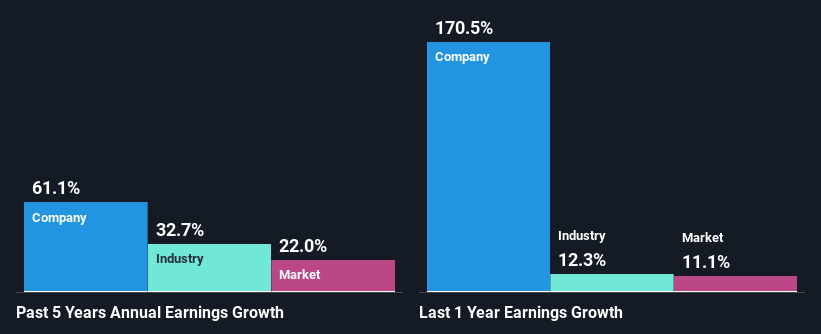Stock Analysis

It is hard to get excited after looking at Epsilon Net's (ATH:EPSIL) recent performance, when its stock has declined 12% over the past week. But if you pay close attention, you might gather that its strong financials could mean that the stock could potentially see an increase in value in the long-term, given how markets usually reward companies with good financial health. Particularly, we will be paying attention to Epsilon Net's ROE today.
Return on Equity or ROE is a test of how effectively a company is growing its value and managing investors’ money. In simpler terms, it measures the profitability of a company in relation to shareholder's equity.
View our latest analysis for Epsilon Net
How Do You Calculate Return On Equity?
ROE can be calculated by using the formula:
Return on Equity = Net Profit (from continuing operations) ÷ Shareholders' Equity
So, based on the above formula, the ROE for Epsilon Net is:
34% = €24m ÷ €69m (Based on the trailing twelve months to June 2023).
The 'return' is the amount earned after tax over the last twelve months. That means that for every €1 worth of shareholders' equity, the company generated €0.34 in profit.
What Has ROE Got To Do With Earnings Growth?
Thus far, we have learned that ROE measures how efficiently a company is generating its profits. We now need to evaluate how much profit the company reinvests or "retains" for future growth which then gives us an idea about the growth potential of the company. Assuming everything else remains unchanged, the higher the ROE and profit retention, the higher the growth rate of a company compared to companies that don't necessarily bear these characteristics.
Epsilon Net's Earnings Growth And 34% ROE
Firstly, we acknowledge that Epsilon Net has a significantly high ROE. Secondly, even when compared to the industry average of 13% the company's ROE is quite impressive. As a result, Epsilon Net's exceptional 61% net income growth seen over the past five years, doesn't come as a surprise.
As a next step, we compared Epsilon Net's net income growth with the industry, and pleasingly, we found that the growth seen by the company is higher than the average industry growth of 33%.

The basis for attaching value to a company is, to a great extent, tied to its earnings growth. The investor should try to establish if the expected growth or decline in earnings, whichever the case may be, is priced in. This then helps them determine if the stock is placed for a bright or bleak future. If you're wondering about Epsilon Net's's valuation, check out this gauge of its price-to-earnings ratio, as compared to its industry.
Is Epsilon Net Using Its Retained Earnings Effectively?
Epsilon Net has a really low three-year median payout ratio of 18%, meaning that it has the remaining 82% left over to reinvest into its business. This suggests that the management is reinvesting most of the profits to grow the business as evidenced by the growth seen by the company.
Besides, Epsilon Net has been paying dividends over a period of four years. This shows that the company is committed to sharing profits with its shareholders.
Summary
Overall, we are quite pleased with Epsilon Net's performance. Specifically, we like that the company is reinvesting a huge chunk of its profits at a high rate of return. This of course has caused the company to see substantial growth in its earnings.
Valuation is complex, but we're helping make it simple.
Find out whether Epsilon Net is potentially over or undervalued by checking out our comprehensive analysis, which includes fair value estimates, risks and warnings, dividends, insider transactions and financial health.
View the Free AnalysisHave feedback on this article? Concerned about the content? Get in touch with us directly. Alternatively, email editorial-team (at) simplywallst.com.
This article by Simply Wall St is general in nature. We provide commentary based on historical data and analyst forecasts only using an unbiased methodology and our articles are not intended to be financial advice. It does not constitute a recommendation to buy or sell any stock, and does not take account of your objectives, or your financial situation. We aim to bring you long-term focused analysis driven by fundamental data. Note that our analysis may not factor in the latest price-sensitive company announcements or qualitative material. Simply Wall St has no position in any stocks mentioned.
About ATSE:EPSIL
Epsilon Net
Epsilon Net S.A. engages in the development of IT systems and solutions in Greece.
Outstanding track record with flawless balance sheet.

